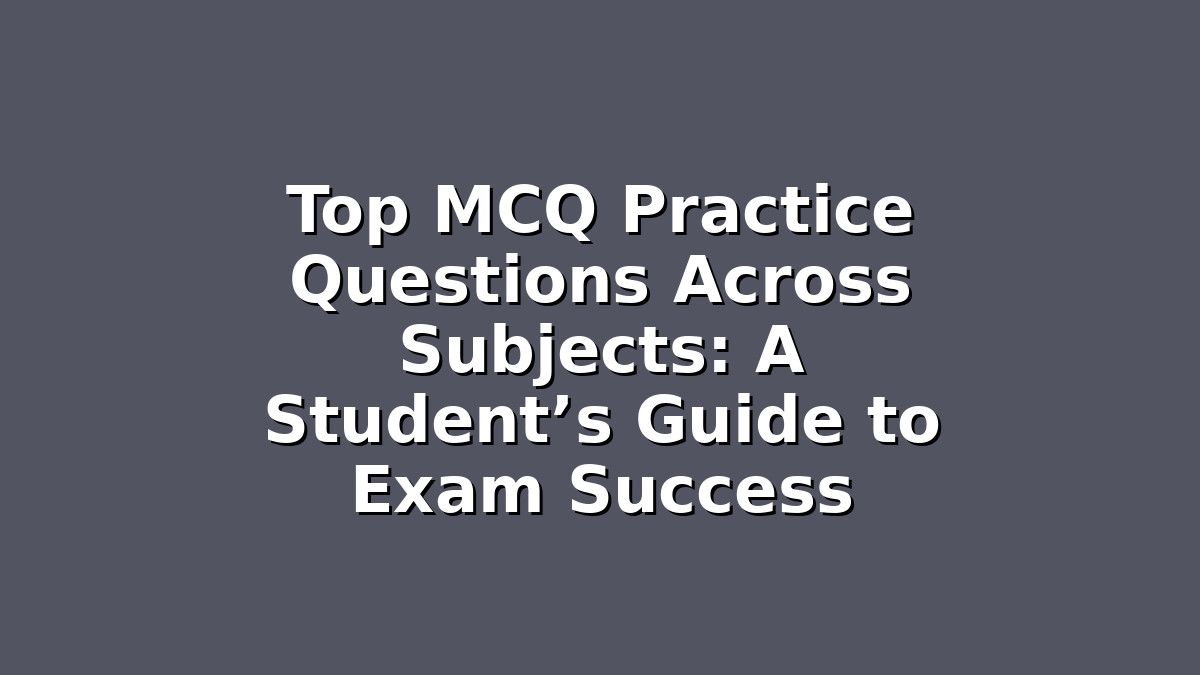Preparing for exams can often feel overwhelming, especially when you have multiple subjects to study and limited time. One effective way to boost your confidence and sharpen your knowledge is by practicing multiple-choice questions (MCQs). MCQs are widely used in school, college, and competitive exams because they test your understanding of key concepts quickly and efficiently. In this comprehensive guide, we’ll explore how practicing MCQs across different subjects can help you excel. We’ll also share practical tips to maximize your study sessions with MCQs and highlight subject-specific strategies to get the most out of your preparation.
Why MCQ Practice is Essential for Students
Multiple-choice questions are not just about memorizing facts; they challenge you to think critically, evaluate options, and recall information under exam conditions. Regular MCQ practice helps you identify your strengths and weaknesses, improves your time management skills, and familiarizes you with exam patterns. Additionally, practicing MCQs allows you to engage more actively with your study material, making learning more interactive and less monotonous. Whether you’re preparing for school exams, college tests, or competitive assessments like SAT, NEET, or GRE, incorporating MCQs into your study routine can be a game-changer.
—
1. Effective MCQ Practice Strategies for Science and Math Subjects
Science (Physics, Chemistry, Biology) and Math are subjects that require both conceptual understanding and problem-solving skills. MCQs in these disciplines often test your grasp of formulas, definitions, processes, and calculations.
Tips for Science and Math MCQ Practice:
– Understand Core Concepts First: Before diving into MCQs, ensure you have a solid grasp of fundamental concepts. MCQs are most effective when used to reinforce and apply what you’ve learned.
– Use Stepwise Problem Solving: For math questions, practice solving problems step-by-step and then check your answers with MCQs. This approach helps you understand where you might make mistakes under exam pressure.
– Focus on Application-Based Questions: Many MCQs test the application of theories or formulas, such as calculating force in physics or balancing chemical equations in chemistry. Look for practice questions that challenge you to apply concepts rather than just recall facts.
– Practice with Timed Quizzes: Time management is critical in exams. Use online platforms or app-based quizzes to simulate timed MCQ practice sessions. This will help improve your speed without sacrificing accuracy.
– Review Explanations Thoroughly: Don’t just mark answers as right or wrong. Read detailed explanations to understand why certain options were incorrect, which reinforces your learning and reduces careless errors in future.
—
2. Mastering Language and Social Studies MCQs
Subjects like English, History, Geography, and Civics often include MCQs that test vocabulary, grammar, comprehension, factual knowledge, and critical thinking.
Tips for Language and Social Studies MCQ Practice:
– Build Strong Vocabulary and Grammar Skills: For English MCQs, daily reading and vocabulary exercises are invaluable. Use flashcards to memorize words and practice grammar rules regularly.
– Practice Reading Comprehension: Many language exams include passages followed by MCQs about the main idea, tone, or inference. Practice identifying key information quickly and accurately.
– Create Timelines and Mind Maps for History: For history or civics, create visual aids like timelines or mind maps to organize facts, events, and concepts. This makes recalling information easier during MCQ tests.
– Connect Concepts in Geography and Civics: Social studies often involves understanding relationships between places, people, and governance structures. Try to relate topics to current events or real-world examples to deepen your understanding.
– Use Past Papers and Sample MCQs: Reviewing previous exam questions or sample MCQs helps you become familiar with question formats and frequently tested topics.
—
3. Leveraging Technology and Resources for MCQ Practice
In today’s digital age, there’s an abundance of resources to help you practice MCQs effectively. Using the right tools can make studying more engaging and efficient.
Tips for Using Technology in MCQ Practice:
– Online MCQ Platforms: Websites like Khan Academy, Quizlet, and BYJU’S offer subject-wise MCQ questions with instant feedback. Many of these platforms also provide explanations and video tutorials.
– Mobile Apps for On-the-Go Practice: Apps such as GradeUp, Toppr, and ExamPrep allow you to practice MCQs anytime and anywhere, turning idle moments into productive study sessions.
– Interactive Quizzes and Adaptive Learning: Some platforms use adaptive technology to adjust the difficulty level based on your performance, ensuring you’re always challenged but not overwhelmed.
– Create Your Own MCQ Sets: Write your own MCQs while studying topics. This active creation process deepens your understanding and prepares you for the types of questions that might appear in exams.
– Join Study Groups and Forums: Engaging with peers in online study groups or forums like Reddit’s r/StudentCommunity can expose you to diverse MCQs and study tips, as well as motivate you during exam prep.
—
Conclusion
Practicing multiple-choice questions across subjects is one of the most effective strategies to prepare for exams. By integrating regular MCQ practice into your study routine, you improve your recall, application skills, and exam readiness. Remember to focus on understanding concepts, manage your time well, and use technology wisely to enhance your learning experience. Stay consistent, review your mistakes, and approach each practice session with a positive mindset. With dedication and the right approach, MCQ practice can help you unlock your full potential and achieve your academic goals.
Good luck with your studies, and keep practicing!

Responses